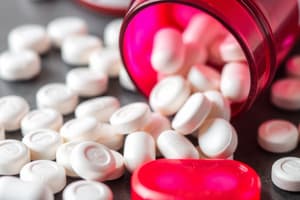Podcast
Questions and Answers
What acts by partially neutralizing gastric hydrochloric acid and are widely available in many over-the-counter (OTC) preparations for the relief of indigestion, heartburn, and sour stomach?
What acts by partially neutralizing gastric hydrochloric acid and are widely available in many over-the-counter (OTC) preparations for the relief of indigestion, heartburn, and sour stomach?
Antacids
What are 6 side effects of antacids?
What are 6 side effects of antacids?
- Constipation (with aluminum or calcium carbonate antacids) 2. Diarrhea (with magnesium antacids) 3. Electrolyte imbalance 4. Urinary calculi (stone formation) and renal complications 5. Osteoporosis (with aluminum antacids) 6. Belching and flatulence (with calcium carbonate and sodium bicarbonate)
What are 4 precautions/contraindications of antacids?
What are 4 precautions/contraindications of antacids?
- Heart failure 2. Chronic kidney disease or history of renal calculi 3. Cirrhosis of the liver or edema 4. Dehydration or electrolyte imbalance
What are 4 drugs that antacids should be taken within 2 hours of?
What are 4 drugs that antacids should be taken within 2 hours of?
What are 3 types of drugs that when combined with antacids may increase action and precipitate side effects?
What are 3 types of drugs that when combined with antacids may increase action and precipitate side effects?
How do histamine 2 blockers (H2-blockers) work to relieve acid indigestion and heartburn?
How do histamine 2 blockers (H2-blockers) work to relieve acid indigestion and heartburn?
What are 3 side effects of histamine 2 blockers (H2-blockers)?
What are 3 side effects of histamine 2 blockers (H2-blockers)?
What are 3 precautions/contraindications for histamine 2 blockers (H2-blockers)?
What are 3 precautions/contraindications for histamine 2 blockers (H2-blockers)?
What are 8 drugs that might cause an interaction when combined with histamine 2 blockers (H2-blockers)?
What are 8 drugs that might cause an interaction when combined with histamine 2 blockers (H2-blockers)?
What are 5 examples of proton pump inhibitors?
What are 5 examples of proton pump inhibitors?
What are 2 side effects of proton pump inhibitors?
What are 2 side effects of proton pump inhibitors?
What are 5 drugs that might cause an interaction when combined with proton pump inhibitors?
What are 5 drugs that might cause an interaction when combined with proton pump inhibitors?
Which gastric mucosal agent is a synthetic form of prostaglandin E1?
Which gastric mucosal agent is a synthetic form of prostaglandin E1?
What are 3 side effects of gastric mucosal agents?
What are 3 side effects of gastric mucosal agents?
What are 3 precautions/contraindications for gastric mucosal agents?
What are 3 precautions/contraindications for gastric mucosal agents?
What is administered on an empty stomach and then reacts with hydrochloric acid in the stomach?
What is administered on an empty stomach and then reacts with hydrochloric acid in the stomach?
Which bacterial plays a major role in the development of gastritis, gastric and duodenal ulceration, and gastric cancer?
Which bacterial plays a major role in the development of gastritis, gastric and duodenal ulceration, and gastric cancer?
What is an example of an anticholinergic and antimuscarinic agent used for the treatment of irritable bowel syndrome?
What is an example of an anticholinergic and antimuscarinic agent used for the treatment of irritable bowel syndrome?
What are 5 side effects of Dicyclomine (Bentyl)?
What are 5 side effects of Dicyclomine (Bentyl)?
What are 6 precautions/contraindications for Dicyclomine (Bentyl)?
What are 6 precautions/contraindications for Dicyclomine (Bentyl)?
What are 3 drugs that might cause an interaction when combined with Dicyclomine (Bentyl)?
What are 3 drugs that might cause an interaction when combined with Dicyclomine (Bentyl)?
What are 2 drugs that have chemical structures similar to those of aspirin and exhibit anti-inflammatory activity in the GI tract?
What are 2 drugs that have chemical structures similar to those of aspirin and exhibit anti-inflammatory activity in the GI tract?
What are 4 side effects of salicylates?
What are 4 side effects of salicylates?
What are 5 precautions/contraindications of salicylates?
What are 5 precautions/contraindications of salicylates?
What are 5 drugs that might cause an interaction when combined with salicylates?
What are 5 drugs that might cause an interaction when combined with salicylates?
What antidiarrheal drug has anti-infective and antisecretory properties?
What antidiarrheal drug has anti-infective and antisecretory properties?
What are 3 side effects of Bismuth Subsalicylate?
What are 3 side effects of Bismuth Subsalicylate?
What are 3 drugs that might cause an interaction when combined with Bismuth Subsalicylate?
What are 3 drugs that might cause an interaction when combined with Bismuth Subsalicylate?
What are 4 precautions/contraindications for Bismuth Subsalicylate?
What are 4 precautions/contraindications for Bismuth Subsalicylate?
What works by slowing intestinal motility, thus allowing for more reabsorption of fluid?
What works by slowing intestinal motility, thus allowing for more reabsorption of fluid?
What are 2 side effects of Opiate agonists?
What are 2 side effects of Opiate agonists?
What are 6 precautions/contraindications for Opiate agonists?
What are 6 precautions/contraindications for Opiate agonists?
What are living microorganisms that can alter a patient's intestinal flora?
What are living microorganisms that can alter a patient's intestinal flora?
What is an acid-producing probiotic bacterium, available in several forms OTC?
What is an acid-producing probiotic bacterium, available in several forms OTC?
What are 4 precautions/contraindications for probiotics?
What are 4 precautions/contraindications for probiotics?
What is caused primarily by the eradication of the native intestinal flora with broad-spectrum antimicrobials?
What is caused primarily by the eradication of the native intestinal flora with broad-spectrum antimicrobials?
What are used in the symptomatic treatment of gastric bloating and postoperative gas pains?
What are used in the symptomatic treatment of gastric bloating and postoperative gas pains?
What promote evacuation of the intestine and are used to treat constipation?
What promote evacuation of the intestine and are used to treat constipation?
What are the 7 types of laxatives?
What are the 7 types of laxatives?
Which type of laxative softens the stool by absorbing water?
Which type of laxative softens the stool by absorbing water?
What type of laxative promotes stool movement through the intestines?
What type of laxative promotes stool movement through the intestines?
What type of laxative promotes secretion of water into the intestinal lumen?
What type of laxative promotes secretion of water into the intestinal lumen?
What are 4 side effects of saline laxatives?
What are 4 side effects of saline laxatives?
What are 6 precautions/contraindications of saline laxatives?
What are 6 precautions/contraindications of saline laxatives?
What type of laxative are cathartic in action?
What type of laxative are cathartic in action?
What are 5 side effects of stimulant laxatives?
What are 5 side effects of stimulant laxatives?
What are 4 precautions/contraindications of stimulant laxatives?
What are 4 precautions/contraindications of stimulant laxatives?
What type of laxative draws water from the tissues into the feces?
What type of laxative draws water from the tissues into the feces?
What type of laxative works by increasing intestinal fluid secretion?
What type of laxative works by increasing intestinal fluid secretion?
What are 3 side effects of Chloride channel activators?
What are 3 side effects of Chloride channel activators?
What are 3 precautions/contraindications for Chloride channel activators?
What are 3 precautions/contraindications for Chloride channel activators?
What are used in the prevention or treatment of nausea, vomiting, vertigo, or motion sickness?
What are used in the prevention or treatment of nausea, vomiting, vertigo, or motion sickness?
Flashcards are hidden until you start studying
Study Notes
Antacids
- Antacids partially neutralize gastric hydrochloric acid, providing relief for indigestion, heartburn, and sour stomach.
- Common side effects include constipation (aluminum/calcium), diarrhea (magnesium), electrolyte imbalance, urinary calculi, osteoporosis (aluminum), and belching/flatulence (calcium/sodium bicarbonate).
- Precautions include heart failure, chronic kidney disease, cirrhosis, and dehydration.
- Antacids can interact if taken within 2 hours of anti-infectives, digoxin, salicylates, and bisphosphonates.
H2-Blockers
- Histamine 2 blockers reduce gastric acid secretions to relieve acid indigestion and heartburn.
- Side effects may include diarrhea, dizziness, rash, headache, mild gynecomastia (cimetidine), and mental confusion (especially in older adults).
- Renal disease, pregnancy, and lactation are precautions for use.
- Potential interactions include warfarin, phenytoin, beta-blockers, benzodiazepines, lidocaine, and proton pump inhibitors.
Proton Pump Inhibitors (PPIs)
- Common PPIs include omeprazole, lansoprazole, rabeprazole, pantoprazole, and esomeprazole.
- Used for short-term relief of GERD and ulcers, with potential long-term use for severe cases.
- Side effects consist of diarrhea, constipation, nausea, vomiting, and heightened risk of pneumonia or C. difficile infection.
- Interactions with clopidogrel, H2-blockers, sucralfate, and some anticoagulants may occur.
Gastric Mucosal Agents
- Misoprostol inhibits gastric acid secretion and protects the mucosa, especially important for patients on NSAIDs.
- Side effects include diarrhea, nausea, menstrual irregularities, and risks of spontaneous abortion.
- Precautions include women of childbearing age, pregnant women, and children under 12.
Sucralfate
- Sucralfate adheres to mucosa in the stomach, protecting ulcers from irritation when administered on an empty stomach.
Helicobacter pylori
- This bacterium contributes significantly to gastritis, ulceration, and gastric cancer.
Anticholinergics for GI Motility
- Dicyclomine is an anticholinergic agent that decreases gastrointestinal motility.
- Side effects include dry mouth, constipation, blurred vision, dizziness, urinary retention, and confusion.
- Contraindications involve glaucoma, unstable cardiac disease, and obstructive GI conditions.
Salicylates
- Mesalamine and sulfasalazine are used to treat Crohn's disease and ulcerative colitis, promoting targeted release in the intestinal tract.
- Side effects can include anorexia, nausea, vomiting, headache, and abdominal cramps.
- Allergies to salicylates/sulfonamides, renal/hepatic impairment are contraindications.
Bismuth Subsalicylate
- Functions as an antidiarrheal with antisecretory properties.
- Possible side effects include constipation, tongue/stool discoloration, and ringing in the ears.
- Interactions with warfarin and antibiotics may diminish effectiveness.
Opiate Agonists
- Work by slowing intestinal motility to aid in fluid reabsorption, utilized as an antidiarrheal.
- Side effects involve anticholinergic effects and abdominal distention, as well as nausea or vomiting.
- Contraindications include diarrhea due to infections, fever, young children, and obstructive jaundice.
Probiotics
- Living microorganisms that can positively influence intestinal flora, effective in managing various GI diseases.
- Lactobacillus acidophilus is an example of an acid-producing probiotic available OTC.
- Precautions include weakened immune systems, sensitivity to milk, and potential bacteremia risks in vulnerable populations.
Clostridium difficile Diarrhea
- Mainly occurs due to disruption of native intestinal flora from broad-spectrum antimicrobials and PPI/H2-blocker overuse.
Antiflatulents
- Used to relieve gastric bloating and gas pains by dispersing gas bubbles in the GI tract.
Laxatives
- Classification includes bulk-forming, stool softeners, emollients, saline, stimulant, osmotic, and chloride channel activators.
- Bulk-forming laxatives increase fecal mass to ease defecation, while emollients coat and soften stool.
- Stimulant laxatives produce strong peristaltic activity and are habit-forming; their use should be limited.
Chloride Channel Activators
- Increase intestinal fluid secretion through specific chloride channel activation, with side effects including nausea, diarrhea, and headache.
Antiemetics
- Utilized for treating nausea, vomiting, vertigo, or motion sickness.
Studying That Suits You
Use AI to generate personalized quizzes and flashcards to suit your learning preferences.



